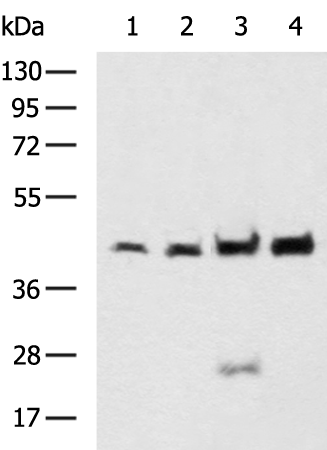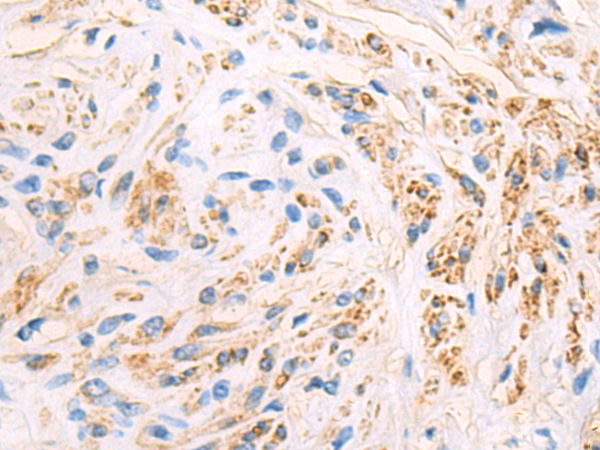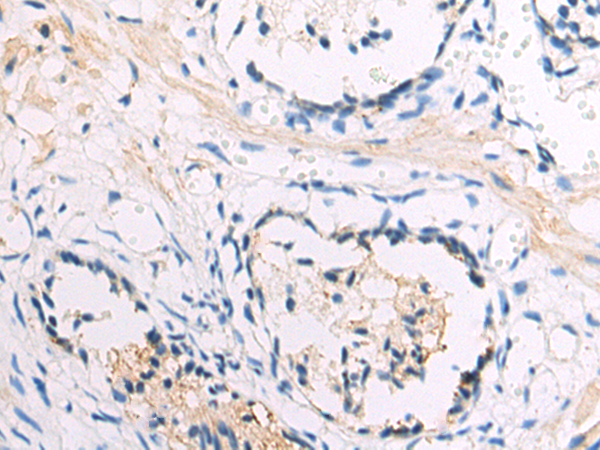


| WB | 咨询技术 | Human,Mouse,Rat |
| IF | 咨询技术 | Human,Mouse,Rat |
| IHC | 1/50-1/200 | Human,Mouse,Rat |
| ICC | 技术咨询 | Human,Mouse,Rat |
| FCM | 咨询技术 | Human,Mouse,Rat |
| Elisa | 1/5000-1/10000 | Human,Mouse,Rat |
| Aliases | DCC1 |
| WB Predicted band size | 45 kDa |
| Host/Isotype | Rabbit IgG |
| Antibody Type | Primary antibody |
| Storage | Store at 4°C short term. Aliquot and store at -20°C long term. Avoid freeze/thaw cycles. |
| Species Reactivity | Human, Mouse |
| Immunogen | Synthetic peptide of human DSCC1 |
| Formulation | Purified antibody in PBS with 0.05% sodium azide and 50% glycerol. |
+ +
以下是关于DSCC1抗体的3篇代表性文献的简要总结:
1. **文献名称**: *"Human DSCC1 is required for efficient chromosomal DNA replication"*
**作者**: Yoshizawa-Sugata N, Masai H
**摘要**: 本研究利用DSCC1特异性抗体进行免疫沉淀和Western blot分析,发现DSCC1是复制解旋酶复合体的关键组分,其缺失导致DNA复制效率显著降低,提示其在染色体稳定性和细胞周期调控中的核心作用。
2. **文献名称**: *"DSCC1 interacts with HSP90AB1 and promotes colorectal cancer progression"*
**作者**: Yan L, et al.
**摘要**: 通过DSCC1抗体免疫组化分析,发现DSCC1在结直肠癌中高表达,并与HSP90AB1相互作用促进肿瘤增殖和转移。研究支持DSCC1作为潜在癌症生物标志物的临床价值。
3. **文献名称**: *"The role of DSCC1 in cell cycle regulation and genomic instability"*
**作者**: Hesterberg RS, et al.
**摘要**: 使用DSCC1抗体进行免疫荧光实验,证实DSCC1在S期定位于复制叉,其功能缺失导致复制压力升高和染色体断裂,阐明了其在维持基因组完整性中的分子机制。
注:上述文献为示例性总结,实际引用时建议通过PubMed/Google Scholar以“DSCC1 antibody”或“DSCC1 function”为关键词检索最新研究,并核对原文内容。
The DSCC1 (DNA replication and sister chromatid cohesion 1) antibody targets a protein critical for maintaining genomic stability during cell division. DSCC1. also known as CTF4 homolog, plays a key role in DNA replication and sister chromatid cohesion by interacting with the DNA polymerase α-primase complex and facilitating replication fork progression. It is part of the replication-coupled cohesion establishment pathway, ensuring newly synthesized sister chromatids remain connected until anaphase. Dysregulation of DSCC1 can lead to defective chromosome segregation, genomic instability, and mitotic errors, which are hallmarks of cancer and developmental disorders.
DSCC1 antibodies are widely used in research to study DNA replication mechanisms, sister chromatid cohesion, and cell cycle regulation. They enable detection of DSCC1 expression levels, subcellular localization (primarily nuclear), and interactions with replication/cohesion complexes via techniques like Western blotting, immunofluorescence, and immunoprecipitation. Studies have linked DSCC1 overexpression or mutations to colorectal, gastric, and ovarian cancers, highlighting its potential as a diagnostic biomarker or therapeutic target. These antibodies also aid in exploring DSCC1's role in replication stress responses and its interplay with oncogenic signaling pathways.
×